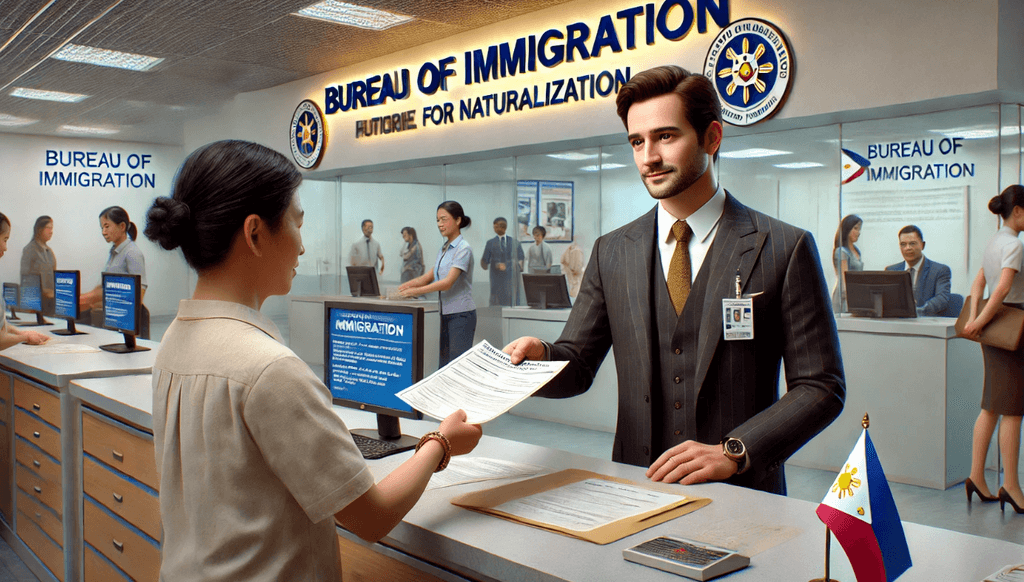Types of citizenship in the Philippines
The Philippines recognizes different types of citizenship, primarily defined by how an individual acquires their citizenship status. Understanding the types to get citizenship in the Philippines is crucial because they determine a Filipino citizen’s rights, privileges, and responsibilities. Below are the two types of citizenship in the Philippines.
Natural-born Filipino citizen
An individual who becomes a natural-born Filipino citizen by default, without the necessity for formal legal action, is known as a natural-born Filipino citizen. People born to Filipino parents automatically have this citizenship, as birthright usually grants it. Additionally, for those who choose to become citizens of the Philippines, under the 1987 Constitution, more situations are covered where individuals are regarded as natural-born citizens.
This includes scenarios where citizenship may be reclaimed or retained under particular circumstances. For instance, it might involve those born to Filipino parents, regardless of whether the birth was outside the Philippines, and those who were naturalized citizens before the adoption of the constitution, among other specific provisions. With this kind of citizenship, people are guaranteed to get citizenship in the Philippines from birth and enjoy all the rights and benefits that come with that position.
Naturalized Filipino citizen
Foreign nationals who complete the naturalization process and become citizens of the Philippines are known as naturalized Filipino citizens. A foreigner is granted citizenship rights and benefits through the official legal process of naturalization, which integrates them into the political community of the Philippines. The person’s allegiance to get citizenship in the Philippines is usually fully transferred to the country, and their previous citizenship is normally renounced. The Revised Naturalization Act (CA No. 473, as modified) provides instructions on how a foreign person can become a naturalized citizen, including residency requirements, moral character assessments, and knowledge of the country’s laws and language.

What is the basis of Philippine citizenship?
The 1987 Philippine Constitution definition of the jus sanguinis principle is the basis of Philippine citizenship. As per this principle, citizenship is decided by blood connections, which implies that regardless of the child’s place of birth, a child with at least one Filipino parent automatically acquires Filipino citizenship.
There are two categories of Filipino citizens: naturalized and natural-born. No official procedure is needed for a natural-born Filipino to get citizenship in the Philippines; it is given to them by birth through Filipino parents. The jus soli principle is based on the child’s place of birth. Therefore, whether a child is born inside or outside the Philippines, under jus sanguinis, the child of Filipino parents is recognized as a natural-born Filipino citizen.
How to get Filipino citizenship?
The naturalization process is a practical route for foreigners who want to become citizens of the Philippines. Below are the five steps on how to get Filipino citizenship.
Step 1: Check conditions for eligibility
To be eligible for naturalization in the Philippines, foreigners must meet a few requirements. First, they must be at least 18 years old and have spent ten years in the nation. Foreigners must have no criminal background and strong moral principles, which refers to the adherence to ethical standards. They must also have a solid grasp of the Philippines government, culture, and history and be fluent in Filipino or any regional language.
Step 2: Gathering documents
Foreigners must gather and prepare a few essential documents to get citizenship in the Philippines. Among these is their birth certificate or a comparable document attesting to their identity and age. Their marriage certificate is required if they are married. Proof of residence demonstrating that foreigners have lived in the Philippines for at least ten years is also necessary. An affidavit of intent to become a citizen of the Philippines, two character references from reliable people, and police and NBI clearances attesting to their moral character are also needed.
Step 3: Application filing
Foreigners can submit their applications for naturalization whenever their paperwork is ready. In the Philippines, this can be completed at the Bureau of Immigration (BI) or, if they live outside, at a Philippine Embassy or Consulate. To get citizenship in the Philippines, foreigners must fill out the application, include essential documentation, and make appropriate fee payments. The processing of your application may take several months, so be ready for a waiting time.
Step 4: Hearing for naturalization
If your application is accepted, you will be set for a naturalization hearing to get citizenship in the Philippines. During this hearing, you will answer inquiries about your application and take an oath of allegiance to the Republic of the Philippines. It is often conducted in English or Filipino.
Step 5: Oath-taking and issuance of the naturalization certificate
After the naturalization hearing, you must swear an oath of allegiance. A naturalization certificate will then be granted to you, formally identifying you as a citizen of the Philippines.

Requirements to get Filipino citizenship
Becoming a naturalized citizen of the Philippines involves meeting several key requirements. Here are six requirements to get Filipino citizenship:
- Birth certificate or other proof of identity and age: Foreigners must produce an official copy of their birth certificate or another document verifying their identity and age to get citizenship in the Philippines.
- Marriage certificate (if applicable): If you are married, you must submit a copy of your marriage certificate. This is especially significant if your spouse is a Filipino national.
- Proof of residence in the Philippines: Foreigners must have spent at least ten years in the Philippines. Rental agreements, utility bills, and other official documentation establishing long-term residency are all acceptable evidence to get citizenship in the Philippines.
- Police and NBI clearance: Foreigners must obtain police and National Bureau of Investigation (NBI) clearance to exhibit excellent moral character. These certifications confirm that they have no criminal record while in the Philippines.
- Affidavit of intent: This document formalizes your application and expresses your dedication to getting citizenship in the Philippines.
- Two character references: List at least two trustworthy people who can attest to your character. These could be community leaders, employers, or well-known individuals who know you well.
Benefits of Philippine citizenship
Having citizenship gives you access to more chances and security since you can exercise your rights and benefits as a citizen of the Philippines. Here are the benefits of Philippine citizenship:
- Property ownership: Citizenship allows you to buy property in the Philippines without the usual restrictions that apply to foreigners, which increases the accessibility and financial returns of real estate investments.
- Work and residence: You have complete freedom to live and work in the Philippines, which allows you to be flexible and free in both your personal and professional lives once you get citizenship in the Philippines.
- Business ownership: Being a citizen allows you to fully own a company without requiring a local partner, giving you total control over the company’s operations and financial results.
- Labor market at a low cost: Once you get citizenship in the Philippines, your company can achieve maximum profitability and efficiency by taking advantage of the highly efficient labor market in the country.
How much does it cost to get citizenship in the Philippines?
Acquiring citizenship in the Philippines involves several fees, each contributing to the overall cost. Here are the costs to get citizenship in the Philippines:
- Application fee: ₱ 1,000 ($17.49)
- Certificate fee: ₱ 500 ($8.75)
- Department of Justice processing fee: ₱ 1,500 ($26.24)
- Legal research fee: ₱ 20 ($0.35)
- Identification certificate: ₱ 3,000 ($52.47)
- Service fee: ₱ 5,000 ($87.45)
- Additional legal research fee for each immigration fee (except head tax and fines): ₱ 10 ($0.17)
- Express fee (certification): ₱ 500 ($8.75)
- Express fee (filing): ₱ 500 ($8.75)
- Express fee (IC processing): ₱ 500 ($8.75)
Summing up all these fees, the total cost to get citizenship in the Philippines is ₱ 12,550 ($220). It’s important to note that these fees are subject to change, and it’s always a good idea to check with the relevant Philippine authorities for the most current information.
Expert assistance for obtaining Philippine citizenship
Obtaining citizenship in the Philippines involves navigating complex legal processes, but our experienced team is here to guide you through every step. From understanding eligibility requirements, preparing necessary documents, submitting your application, and ensuring compliance with all regulations, we provide comprehensive support tailored to your needs. Whether you’re applying through naturalization, marriage, or other means, our personalized assistance ensures a smooth and successful citizenship process. You can also email us at [email protected] for more detailed inquiries and specialized guidance. Contact us today to start your journey toward Philippine citizenship with confidence!

Frequently Asked Questions (FAQs)
What is citizenship in the Philippines?
Citizenship in the Philippines means being a citizen from birth without taking additional steps to acquire or perfect their Philippine citizenship.
Can I get dual citizenship in the Philippines?
Yes, you can get dual citizenship in the Philippines under the Philippine Citizenship Retention and Reacquisition Act of 2003; natural-born citizens who have acquired foreign citizenship through naturalization can re-acquire or retain their Philippine citizenship, thus allowing dual citizenship.
How can a foreigner become a Filipino citizen?
A foreigner can become a Filipino citizen by naturalization after meeting a residency requirement of typically ten years, acquiring real estate, demonstrating proficiency in English or Spanish and a Philippine language, and fulfilling a reasonable character requirement.
How many years does it take to become a Filipino citizen?
Becoming a Filipino citizen takes at least ten years of continuous residence in the Philippines through naturalization.
Can a foreigner become a Filipino citizen by marriage?
No, a foreigner cannot automatically become a Filipino citizen by marriage, although marriage to a Filipino citizen may provide alternative paths to permanent residency.
Can foreigners get citizenship by naturalization in the Philippines?
Yes, foreigners can get citizenship by naturalization in the Philippines if they meet eligibility conditions, gather required documents, file an application, attend a naturalization hearing, take an oath, and receive a naturalization certificate.
How to become a Filipino citizen?
To become a Filipino citizen, one can either be born to Filipino parents (natural-born) or undergo a legal process of naturalization.






